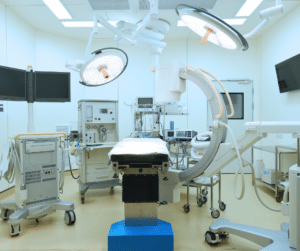The Medical Device License is a legal document required to manufacture, sell, and distribute medical devices. The Medical Device Licence (MDL) and the Medical Device Establishment Licence (MDEL) are the licenses issued by Health Canada, the Health Agency that regulates the medical devices sold in the Canadian market.

These licences are referred to as “medical device” and “medical device establishment,” respectively. In the Canadian market, medical devices are separated into four different classes: Class I, Class II, Class III, and Class IV.
Devices that fall into Classes II, III, and IV are eligible to receive Medical Device Licenses (MDL). In contrast, establishments that manufacture Class I medical devices are eligible to receive Medical Device Establishment Licenses (MDEL). In addition, the MDEL is granted to importers and distributors of all device classes.
A medical device license is a type of intellectual property (IP) license issued by Health Canada to authorize a manufacturer to sell its medical device in Canada.
Medical Device License (MDL) – Common License
It is a license required for a company to manufacture, import, distribute and sell medical devices in Canada.
A medical Device License (MDL) is a permit or license to sell medical devices. Health Canada issues this license. Furthermore, it is a requirement for all medical device manufacturing. Getting MDL becomes easy when you proceed with a reliable platform.
Medical Device Establishment License (MDEL)
Medical Device Establishment License (MDEL) is the document that provides evidence of compliance with the Medical Devices Regulations. The Medical Device Establishment Licence (MDEL) is an authorization issued by Health Canada under the authority of the Food and Drugs Act, which authorizes an establishment to manufacture or import/distribute a medical device.
The MDEL also authorizes an establishment to manufacture or import/distribute software that performs medical functions (SaMD). Health Canada regulates all medical devices that are marketed in Canada.
Renewal of MDEL and MDL
Before April 1 of each year, the MDEL goes through an annual review, and before November 1 of each year, the MDL for each device class goes through a renewal process. The application for the initial licence and the application for renewing an existing licence are both different from one another.
It is imperative to select the appropriate application in order to prevent any potential delays in the review process by Health Canada. Quality Smart Solutions has the knowledge and experience to successfully manage and complete the projects required by the Canadian Medical Device Regulator.
Do you need MDL, MDEL, or SaMD Assistance?
Software as a Medical Device (SaMD)
The software industry contributes significantly to the advancement of the healthcare sector. Any software product’s functionality, as well as the manner in which it is represented or labelled for use, determines whether it can be considered a medical device in accordance with the regulations set forth by Health Canada.
Software as a Medical Device (SaMD) is software that monitors or treats human health. Software as a Medical Device (SaMD) is software that has been demonstrated to meet the regulatory requirements of Health Canada’s Medical Devices Program. It can be used instead of an MDL but not in addition to an MDL.
Software as a medical device (SaMD) is a regulatory term used in Canada to describe the approval process for the software that performs medical functions. SaMD is also used as an electronic device offering healthcare services. SaMDs can be used to diagnose, treat, or prevent illness or injury.
Health Canada Medical Device and Quality Management System Requirements
It is essential to get a basic understanding of the whole procedure. It will not only make things easier for you but it will also save you time and money.
When applying for an MDL, you will also be required to demonstrate that you have a quality management system that is certified to ISO 13485 and is in compliance with the Medical Device Single Audit Program (MDSAP).
This demonstrates that your organization is able to fulfill the specific requirements outlined in the Canadian Medical Devices Regulations (CMDR).
Difference
Knowing the difference between MDL, MDEL, and SaMD licenses is essential because they are not interchangeable. However, these terms and licenses are required for different purposes.
The MDL is a license that is required for medical devices. It enables the manufacture, distribution, and sale of medical devices in the United States. This article will explain what the MDL is and what it does.
The MDEL is a Health Canada regulatory classification for medical device establishments. The MDEL licence is an establishment licence, which means that the holder of this licence is permitted to manufacture, import, and distribute medical devices within their specific establishment. This licence is usually granted to businesses that are involved in the production or distribution of medical devices.
The MDEL licence is an important qualification for businesses who want to produce or distribute medical devices. It allows these businesses to operate under strict safety and quality guidelines, and it also allows them to sell their products in a regulated market.
SAMDs are software that act as a medical device. The creation of software for medical devices is one of the areas of the healthcare industry that is expanding at the quickest rate.
Does Canada require that international producers have a local representative in the country?
No. In the case of medical devices, Health Canada does not mandate that a local representative be present. Applications for medical device registration can be submitted by foreign producers, and those applications can be held.
My device has FDA authorization; is there a fast-track for additional markets?
The approvals obtained in other countries are not recognized by Health Canada, and as a result, they do not provide you with any major advantages throughout the approval process. On the other hand, if an application is turned down in another jurisdiction, it can hurt the chances of getting it approved in Canada.
Because a significant portion of the material that must be provided for submissions to Health Canada is the same as that which must be provided for an EU technical file or a US 510(k), having these could potentially reduce the amount of time spent.
Conclusion
The MDL vs MDEL vs SaMD landscape is a complex one, but hopefully this article has given you a better understanding of the differences between these three types of medical devices licences available in Canada.
All medical devices imported into or offered for sale in Canada are subject to the Medical Devices Regulations (the Regulations). These were written with authority granted by the Food and Drugs Act (the Act). The Regulations outline the requirements that must be met for medical devices to be legally imported into Canada, sold there, or advertised there.
We hope you have now grasped the idea of all three terms (MDL, MDEL & SAMD). If you still have questions, feel free to ask the experts now.
Our experts at Quality Smart Solutions are here to help and offer medical device-related regulatory advice and support on successfully securing your medical device license. We can help you by responding to potential information requests, keeping your license updated, and reviewing your device labels.
Learn more about MDEL Registration, License Class Determination, In Vitro Diagnostic Devices (IVD) Registration, SaMD Classification and Registration, or our MDEL Import Agent service.



